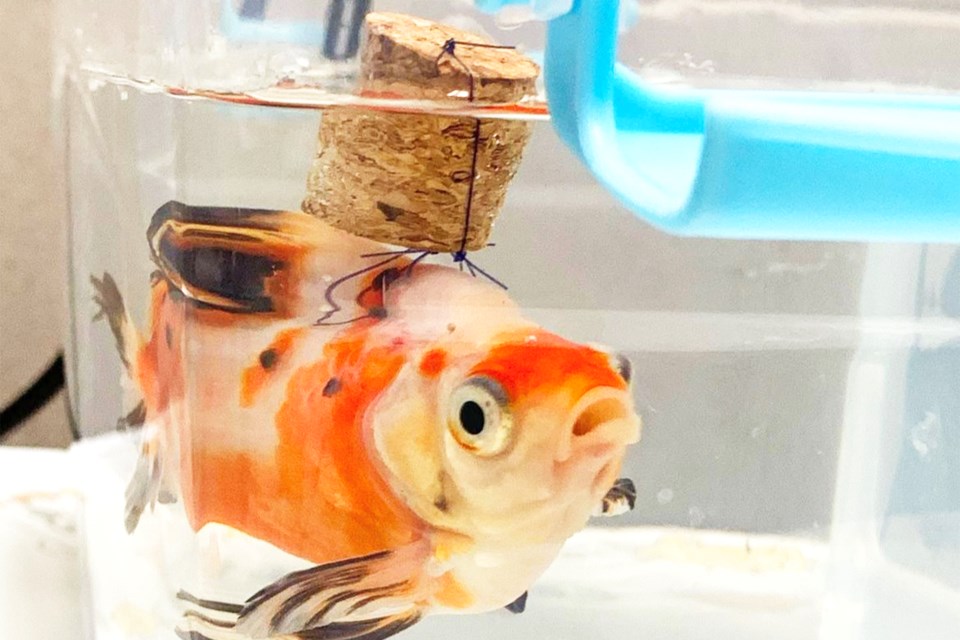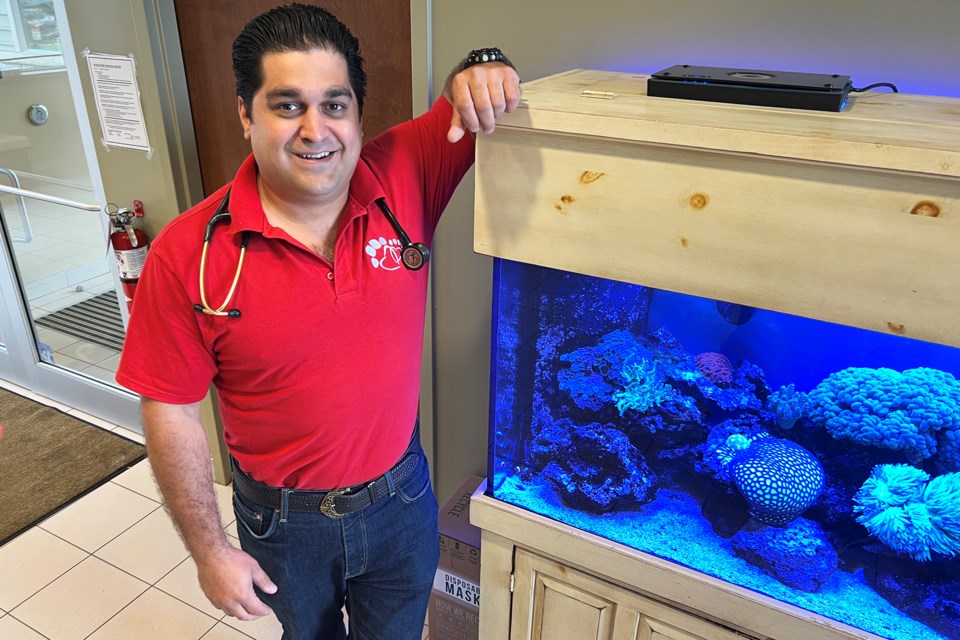What do you do if have a sinking feeling that your beloved goldfish isn’t swimming the way it used to and is struggling to get through life?
Do you just flush the problem away? No way!
Dr. Paul Manesis, an aquatic veterinarian at Allandale Veterinary Hospital on Caplan Avenue in south-end Barrie, can help buoy your spirits. He says there's hope for your fish.
Take, for example, a recent patient that entered his office.
“This client had a bunch of these fancy goldfish, and these types are prone to buoyancy issues, specifically due to their body structure," Manesis tells BarrieToday. "This one came to me and it wasn’t swimming — it was sinking and had a long history of that, which means you could rule out any kind of infectious diseases.
“It was probably just a ruptured swim bladder," he says. "A lot of people would euthanize, but what they don’t realize is that if you could fix that, they can live completely normal lives."
Manesis says there are many techniques to fix this, but his novel solution may be surprising.
"We just tried a method with a cork and it was the first time that I used a cork like that. And it worked out very well,” he says.
Many times, with fish medicine in general, you must be able think on your feet, the doctor says.
“A lot of it is just trial-and-error, sometimes, and that’s what I enjoy about it," Manesis says. "You know what you have to do, you go and try and do it, and as long as you are doing it right and anesthetizing the fish, you’re giving them pain medication, and antibiotics if they need it, it’s just like any other animal, right?”
Aquatic medicine, practised by certified aquatic veterinarians, is a much wider field than most people would think it is, as it involves not only pet fish, but aquaculture, working with large firms such as Ripley’s Aquarium of Canada in Toronto, research and pathology in lakes and oceans, and much more.

“I feel that when people think of fish medicine, they think of individual tiny fish,” Manesis says. “They don’t realize that there is massive import and exporting of fish, or that there are people that need to take care of aquariums, like Ripley’s, for example.”
“What I do is mainly is pet fish and importation of fish,” he adds. “My clients would be large wholesalers that would sell to big box stores. They’ll be getting fish from all over the world. I’ll go there on an infrequent basis and I’ll test the fish coming in, or I will scan the whole building, which is a giant facility."
He also works with private owners, whether they have koi or other expensive fish.
The biggest problem the local aqua-vet routinely sees is the process of introducing new fish to collections and the education around that process.
“The main issue that I see is that people do not quarantine,” Manesis says. “Let’s say they have a pond in their backyard and they have some expensive Japanese koi. People sometimes buy from a koi supplier, or they’ll try and rescue a fish, and they don’t quarantine — meaning if you get that fish from somewhere else, you have your own separate area where you house that fish for a certain period of time, and you monitor that fish to see if it gets sick.
"And if it gets sick, then you treat it, as opposed to just putting it into your pond. A lot of issues that I see would be related to that," he adds.
Manesis says people also need to realize that they are buying fish from people whose job is to, well, sell fish.
"They are flipping the fish quick. (The suppliers) say they are quarantining, but they may not be. Never trust someone else, you have to do it yourself,” he stresses.
“The minute you decide that you are going to throw another fish (into your tank or pond) and you don’t quarantine them, you could ruin or kill everything that you worked so hard on," Manesis adds.
Back to aquatic medicine. It isn’t as structured or as defined as the other veterinary sciences, in practice, he says.
“I like to record everything that I do and extrapolate doses of medicine, because there is not a compendium like there is in dogs and cats and humans, describing that with this disease this is the drug that we use and at this dose," Manesis says. "They are slowly trying to make one.
"Information to source is much more difficult. It requires communicating with all other fish vets to see what works and what has worked.”
It also seems the importance of utilizing an aquatic veterinarian cannot be overstated.
Take, for example, the worrisome issues surrounding the careless use of antibiotics throughout the world and the effects it has on human medicine and the ability to fight off diseases.
Antibiotics, regarding aquatic treatments, have been taken off Canadian shelves in the past due to improper use by the general public, says Manesis.
“Veterinarians know medicine. They know diseases, bacteria, parasites, and what treats those things,” he says. “And when you are talking about antibiotic resistance, and you have some people who really don’t know what they are using and why they are using it, that’s the danger.
“It’s antibiotic resistance and you want to help with humans, at the end of the day. You could be accidentally not handling drugs appropriately, not knowing their side effects, and you get micro-dosed and that leads to resistance,” Manesis adds.
“The next time time you get a disease and it’s not healing, and you are now resistant to X, Y and Z drug, and all because you were dosing your tanks inappropriately and it was getting on your hands and in your mouth. It’s a deep issue and people do not know what these drugs really are."
Manesis has been practising aquatic medicine for seven years now and says he loves every minute of it.
“I’ve kept fish all my life, with freshwater and saltwater fish, and sea horses. I’ve always enjoyed fish and I decided that I might as well start treating them," he says.
Does he have a favourite type of fish in his tanks at home?
“No way. They are all awesome. I can’t answer that. They are all fascinating in their own ways,” Manesis says.
“I also do bee medicine”
But that’s another story for another day.



